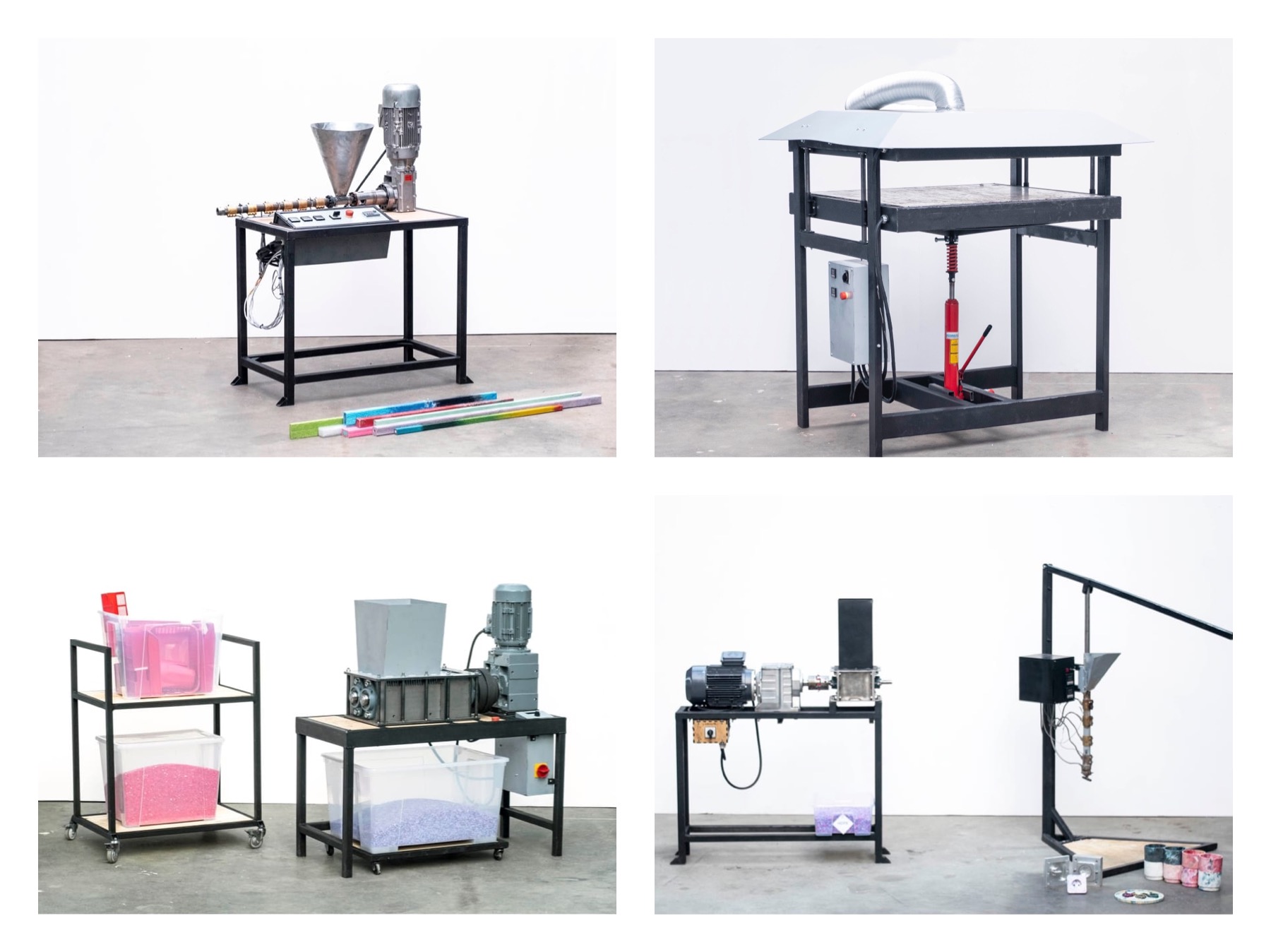
- Sustainable Planet -
- 7mins -
- 618 views
Refugees are recycling plastic trash from a surprising source into ‘Precious products’
A refugee camp in Algeria is turning plastic litter from the Sahara desert into furniture and other items they can use or sell to generate income, with the help of a Dutch-designed DIY recycling system called Precious Plastic.
Precious PlasticS helps refugee camp set up recycling business
Who knew plastic trash was piling up in the Sahara desert? But of course it is. Plastic waste is damaging ecosystems all around the planet. To date, still less than 10% of all plastic is recycled, and production is slated to triple by 2040!
Dutch non-profit Precious Plastic provides people with everything they need to get started recycling plastic waste locally. Their open source recycling machines, products, and a host of online tools and resources can empower anyone to start recycling plastic locally, wherever they are around the world, and even make a business out of it. This is the case in a refugee camp in the middle of the Sahara desert on the Algerian border.
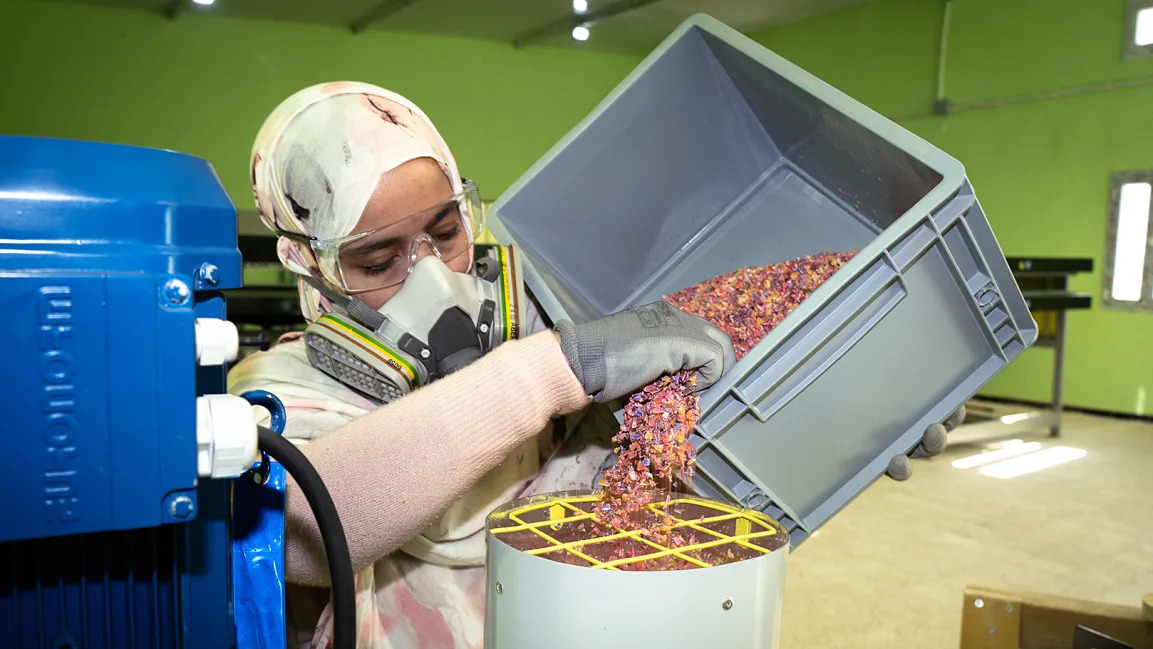
Precious plastic answered UNHCR call for solutions to the waste challenge at refugee camps
In the middle of the Sahara desert on the western border of Algeria, refugee camps hosting tens of thousands of people rely completely on humanitarian aid: Water, food, and other basic supplies come in on trucks. Trash, on the other hand, doesn’t really leave; until recently, all the waste from the camps was dumped nearby in the desert into an ever-growing pile of plastic. But at a new recycling center at one of the camps, refugees are now turning that plastic trash into furniture and other products that they can use.
FastCompany recently reported the story of Precious Plastic, an organisation with a DIY recycling system developed by a Dutch designer who wanted to make recycling more accessible, and who helped set up the center after the United Nations refugee agency (UNHCR) put out a call for solutions to help with the waste challenge at the camps.
“They were looking for a way to solve two problems,” Joseph Klatt, managing director at Precious Plastic told FastCompany. “One, they have a large refugee population there with a high unemployment rate. Everything is brought into the camps, so there’s not a lot of economic activity going on. And secondarily, there’s a lot of waste in the camp. They were looking for a solution to create a new business from processing the plastic waste and providing some economic activity for the refugees.”
Source: FastCompany
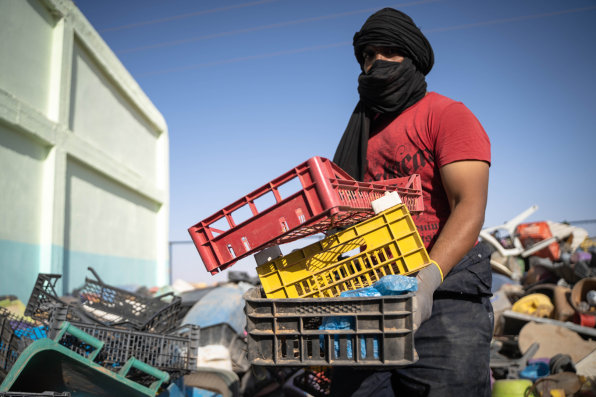
The first products will be sold to non-governmental organisations who support the camps
In late 2021, a U.N. team built a new building to house the recycling center, and Precious Plastic built all the necessary equipment, packed it into a shipping container, and sent it off to Algeria.
One machine shreds the plastic into tiny pieces. Other machines wash and dry them. Then the plastic pieces can be melted down and shaped into new objects. In another approach, the plastic pieces can be spread out on a table, arranged into a pattern, and pressed into flat sheets used to make furniture.
After some training, refugees at the camp quickly started sorting and processing plastic and making products that they needed, including school desks, benches and chairs, and serving sets for tea.
“We had a few design sessions where we talked about what’s possible and how to use this plastic material,” Klatt told FastCompany. “And then they were just super stoked on coming up with ideas that made sense to them—furniture styles that they’re used to, and different ideas they had.”
The U.N. is paying a group of refugees to work at the recycling center for the first year of its operation; thereafter, refugees will become part owners in the facility. The first products will be sold to non-governmental organisations who support infrastructure, like schools at the camps, and have the means to buy the furniture.
It’s not clear when refugees will ever be able to leave the area; Sahrawi people first fled from Moroccan troops in the 1970s, and many people have lived in the camps their entire lives. But the project is one small attempt to improve life in the area. The same system could be used at other refugee camps.
“It’s almost like an island context—a somewhat closed ecosystem,” Klatt says. “There’s an opportunity to try to create a circular economy within that community.”
Source: FastCompany
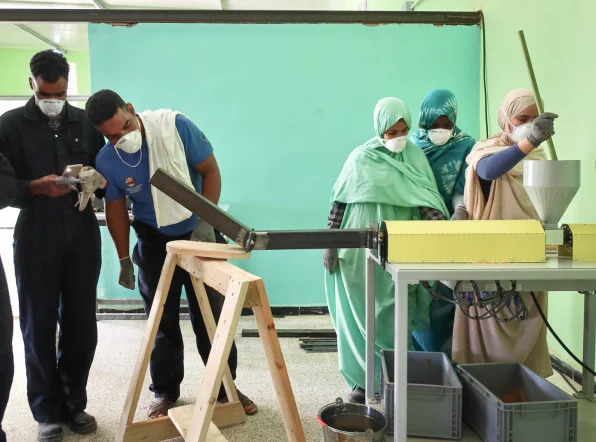
Precious plastic provide the tools to help run a business from recycling
Precious Plastic want to increase the amount of plastic that is recycled around the world. To do this they have been empowering tens of thousands of people around the world with everything they need to start recycle plastic locally.
Precious Plastic develop machines to recycle plastic and share how to replicate them open source online, for free. So everyone can rebuild them and start recycling in their neighbourhood transforming plastic waste into valuable products.
Not only that, but they also provide business tools to help run a business from recycling plastic. People can buy & sell these recycled products, machines and parts on the Precious Plastic Bazar (their online marketplace). Already there is a big and growing global community that sees plastic as a precious material. One business recycles nothing but used PPE face masks!
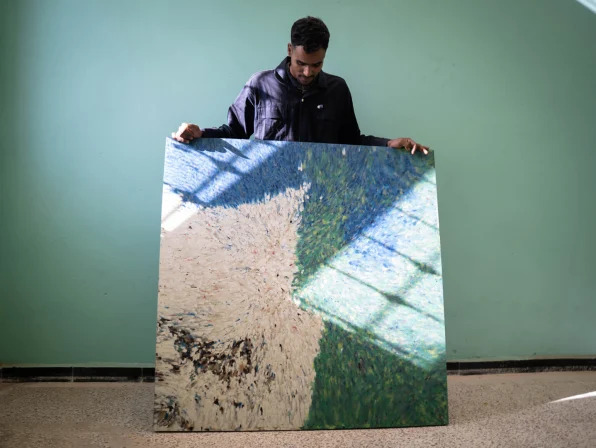
Global impact Facts and figures
Over the past 6 years, Precious Plastic has become a global movement of thousands of people applying their creative genius to solve the plastic waste problem. But now is it doing in real terms?
Back in March 2020, Precious Plastic collaborated with Impacton and ran their first-ever Precious Plastic Global Impact Survey to gather qualitative and quantitative data from the Precious Plastic community. More than 1,000 workspaces, recyclers, collectors, machine builders and community members took part.
- Data on data: a total of 1083 people from 102 countries took part in the survey from March 10th to 20th. Over 54% were under 30 and 1/3 women.
- Kgs recycled: Together, all workspaces surveyed recycled over 376 176 Kgs/year of plastic waste. That amounts to 835 kg/year or 69 kg/month for every Precious Plastic workspace.
- PP & HDPE: Polypropylene (PP) and High-density Polyethylene (HDPE) are the most recycled plastics within the Precious Plastic Universe.
- Team: The average Precious Plastic workspace has a team of 5, of which 1/3 are women. Normally only 1 person is able to work full time and get a salary.
Age breakdown:
18 = 0,8%
18-25 = 21,2%
25-30 = 23,3%
30-35 = 18%
35-40 = 15,9%
40+ = 20,8 %
Recycling since: Precious Plastic has been around for 6yrs now. Some projects are new while some have been around forever.
Longevity stats:
-6% are more than 5 yrs old
-22% are between 2 and 5 yrs old
-30% are between 1 and 2 yrs old
-42% exist since less than a year
- Global annual revenue: Together people and workspaces working on Precious Plastic generated over 2.1 Million € in yearly revenue (€2,131,454 to be precise). That is €7,279 a year or €606 per month for each workspace around the world.
- Total investment: To startup their recycling businesses Precious Plastic workspaces invested a total of €4,950,089 from private, public or personal investment. That comes down to €11,000 per workspace.
- Legal structure: Most workspaces are businesses, companies or non-profit organisations. Just over 10% are schools or universities, while slightly less than 9% are social enterprises. A tiny fraction are cooperatives or part of larger organisations.
- Financially sustainable: Of all workspaces around the world 10% are profitable while 21% are financially sustainable. This happens through direct sales of products, machines and services. Western Europe and South-East Asia are the regions where the most profitable workspaces are located.
- Shredder supremacy: The shredder is by far the most widely available machine in the Precious Plastic Universe. Of all workspaces worldwide 79.6% have a shredder, 57.1% have an injection machine and 50.2% have an extrusion machine.
- Power to the builders: There are thousands of Precious Plastic machines around the world. But how are people getting their hands on them?
-66,3% built themselves
-25,1% got custom machines made
-13,3% bought them on the bazar
* Please note:
Note 1.The organisation sees the survey as a reflection of Precious Plastic up until 2019. This does not take into account the major infrastructure and strategic changes that came with the release of the Precious Plastic Universe (V4).
Note 2. The survey was released in mid-march colliding with the time when the coronavirus pandemic kicked off globally. Many people were unable to fill in the survey as they had other more pressing issues in front of them..
Source: PreciousPlastic
